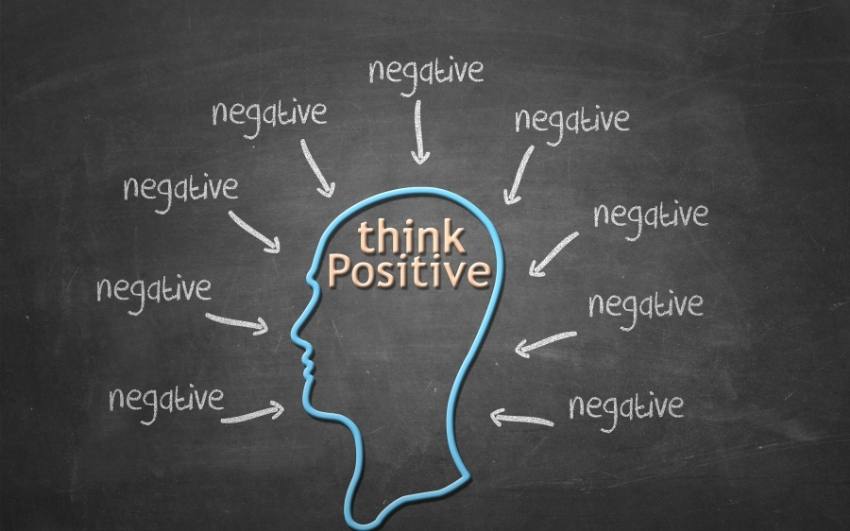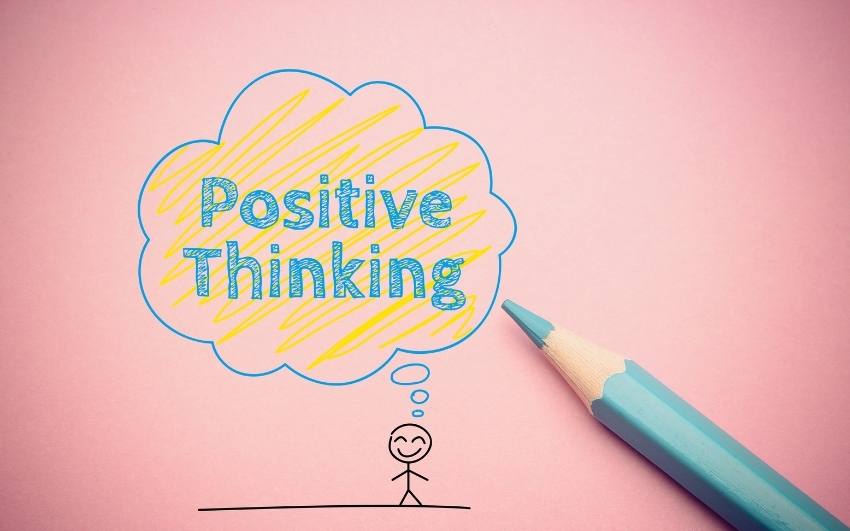On this page

9 Life-Enhancing Positive Mindset Statistics
Do you ever feel like you could use a boost of inspiration to get through the day?
This is where data on positive thinking come in. (Positive mindset statistics)
According to several recent studies, one of the essential things you can do for yourself is to cultivate a happy mindset through positive thinking.
You can begin to transform your perspective and improve your life by learning the power of positive thinking.
Check out these positive thinking statistics demonstrating the value of having a positive outlook on life!
Key Positive Mindset Statistics

- A positive mindset can increase your lifespan by up to 7 years.
- 85% of people who have a positive mindset on life experience significantly less depression and anxiety.
- 85 percent of Americans are making a conscious effort to think positively each morning, according to a new survey.
- People with a positive mindset on life were 50% less likely to die over ten years than those who did not.
- The average person has over 50,000 thoughts daily, and 95% are the same ones from the day before. That means that out of those 50,000 thoughts, only 2,500 are new.
- 87% of people with positive mindsets are more likely to live healthier lifestyles and make better choices for their health.
- People with a more positive mindset can tolerate up to 50% more pain than those with a negative attitude.
- Optimists have a 19% lower risk of early death than pessimists. People with positive mindsets also have better physical health.
- Over 6,000 people found that those with a positive mindset on life were 35% less likely to die during the study period than those with a negative attitude.
9 Life-Enhancing Positive Thinking Statistics

1.Positive mindset increases lifespan
A positive mindset can increase your lifespan by up to 7 years.
According to a recent study on positive mindset statistics, having a positive mindset can increase your lifespan by seven years. The study, which researchers at the University of California conducted, found that people with a positive attitude were more likely to live longer and experience better overall health. The researchers believe that the power of positive thinking may help to protect against stress and adverse health conditions. In addition, the study found that people with a positive mindset were more likely to make healthy lifestyle choices, such as exercising regularly and eating a balanced diet. While the study did not directly prove that positive thinking leads to a longer life, it provides strong evidence of a correlation between the two. So next time you’re feeling down, remember that your attitude may have a more significant impact than you realize.
2. People with a positive mindset have less depression and anxiety
People with a positive mindset on life experience significantly less depression and anxiety.
According to a study conducted by the University of Westminster, 85% of people who have a positive mindset on life experience significantly less depression and anxiety. The study surveyed 2,000 adults and found that those who considered themselves optimists were much more likely to report higher levels of mental well-being. A positive mindset has also been linked with increased lifespan, lower risk of heart disease, and better physical health overall. The benefits of optimism are clear, but how can one develop such a positive mindset? One way is to focus on gratitude. When you take the time to appreciate the good things in your life, it becomes easier to see the glass as half full rather than half empty. You can also try to reframe negative situations in a more positive light. For example, instead of dwelling on a bad day at work, try to focus on the fact that it was just one bad day out of many good ones. Finally, remember that your mindset is a choice. No matter what life throws your way, you always have the power to choose how you respond. You can improve your mental and physical health in various ways by making an effort to be more optimistic.
3. Positive thinking has 50% reduced risk of early death
A positive mindset and positive thinking has been linked with a 50% reduced risk of early death.
According to a recent study, a positive mindset has been linked with a reduced risk of early death. The study, conducted by researchers at the University of Edinburgh, found that people with a positive mindset on life were 50% less likely to die over ten years than those who did not. The findings held even after considering factors such as age, health status, and socioeconomic status. The researchers believe that a positive mindset may help protect against stress’s adverse health effects. They also suggest that a positive attitude may lead to healthier lifestyle choices, such as exercising regularly and eating a balanced diet. Whether you’re facing a challenging situation or simply enjoying life’s simple pleasures, having a positive mindset can be good for your health.
4. 50.000 thoughts daily
The average person has over 50,000 thoughts daily, and 95% are the same ones from the day before.
The average person has over 50,000 thoughts daily, and 95% are the same ones from the day before. That means that out of those 50,000 thoughts, only 2,500 are new. This isn’t necessarily a bad thing – it’s just the way our brains are wired. We focus on survival and safety, so we think about what will help us achieve those goals. However, it does mean that we can get stuck in a rut of negativity if we’re not careful. If we want to break out of that cycle, we must intentionally promote positive thinking. One way to do that is to identify our negative thought patterns and deliberately substitute positive thoughts in their place. Another is to make time for activities that make us happy and help us relax. When we consciously cultivate positive reviews, we can start seeing real-life changes.
5. Positive mindset people make better choices
People with positive mindsets are more likely to live healthier lifestyles and make better choices for their health.
A recent study found that 87% of people with positive mindsets are more likely to live healthier lifestyles and make better choices for their health. The University of California, Los Angeles study surveyed people about their health and lifestyle habits. The participants were also asked to rate their levels of optimism and pessimism. The results showed that those who had positive mindsets on life were more likely to exercise regularly, eat healthy foods, and get regular medical checkups. In contrast, those with negative attitudes were more likely to smoke, drink excessive alcohol, and engage in risky behaviors. The study’s lead author, Dr. Michael F. Scheier, believes that positive thinking leads to increased motivation and self-efficacy, leading to healthier choices. So, it might be worth focusing on your mindset if you’re looking to live a healthier life.
6. A positive mindset increases pain tolerance
A positive mindset can increase your pain tolerance.
A study conducted by Stanford University School of Medicine found that people who have a more positive mindset on life can tolerate up to 50% more pain than those who have a negative attitude. The study participants were asked to rate their pain level on a scale of 1 to 100 while undergoing several tests, including holding their hands in ice water and having hot cream applied to their skin. The results showed that participants with a positive mindset tolerate significantly more pain than those with a negative attitude. While the mechanisms underlying this effect are not fully understood, it is clear that our philosophy can have a significant impact on our experience of pain. So next time you’re feeling pain, try to think positively and see if it makes a difference.
7. According to statistics most of our thoughts are negative
Most of our thoughts are negative – only 10% are positive.
A recent study found that the average person has around 12,000-60,000 thoughts per day; of those, approximately 95% are negative. This isn’t surprising when you consider all the negativity we’re exposed to daily – from the news to social media to our self-doubt. However, what is surprising is how little we realize how often we’re thinking negative thoughts. We tend to believe that our positive opinions outweigh our negative ones when they don’t. The next time you think of a negative review, stop thinking about how often you’ve had that same thought before. Chances are, it’s more often than you realize. And if you can catch yourself in the act of thinking a negative review, you can start to change the way you think and eventually break the cycle of negativity.
8. Optimism leads to better health
Optimists and positive thinker have better physical and mental health.
A study done by Harvard in 2010 found that optimists have a 19% lower risk of early death than pessimists. People with positive mindsets also have better physical health. They are less likely to develop high blood pressure and are less likely to suffer from a heart attack. Optimists also have more robust immune systems and heal from injuries faster. There are many possible explanations for why this is the case. One theory is that optimistic people tend to take better care of themselves. They are more likely to exercise regularly, eat healthy foods, and get enough sleep. They are also less likely to smoke or abuse alcohol. Another possibility is that optimistic people have lower stress hormones, leading to better overall health. Whatever the reason, it is clear that optimistic people enjoy better physical health than their pessimistic counterparts.
9. Optimists live longer according to statistics
Optimists live longer.
A 10-year study of over 6,000 people found that those with a positive mindset on life were 35% less likely to die during the study period than those with a negative mindset. The benefits of a positive mindset are not just mental but also physical. People with a positive attitude tend to have lower stress hormones, inflammation, and anxiety. They also have a more robust immune system and better cardiovascular health. All of these factors add up to a longer, healthier life. So, if you’re looking for a way to improve your health, start by working on your mindset. It’s one of the most important things you can do for your health – and it might help you live longer, too.
Faq

Why is positive thinking critical?
Positive thinking is beneficial in several ways. It can improve mental and physical health, help you cope with stress, and boost your overall well-being. According to positive mindset statistics positive thinking facts, these attitudes can also lead to increased life satisfaction and resilience in the face of adversity. Positive thinking is an excellent place to start if you’re looking for ways to improve your health.
Did you know facts about positive thinking?
1. Positive thinking can improve your physical health.
2. Positive thinking can help you cope with stress and adversity.
3. Positive thinking can lead to increased life satisfaction and resilience.
4. You can learn how to think more positively.
Is positive thinking scientifically proven?
Yes according to positive mindset statistics and facts! A growing body of research shows the benefits of positive thinking. For example, one study found that people with a positive outlook were more likely to have lower stress levels, better cardiovascular health, and longer lifespans.
How effective is positive thinking?
Positive thinking is a powerful tool that can help you improve your life in many ways. Some benefits of positive thinking include increased life satisfaction, better physical health, and greater resilience in the face of stress and adversity.
What are the five advantages of positive thinking?
The five advantages of positive thinking are increased life satisfaction, better physical health, greater resilience, improved social relationships, and increased productivity.
How can I start thinking more positively?
If you want to start thinking more positively, you can do a few things.
- First, focus on the good things in your life and be thankful for them.
- Second, make an effort to be more optimistic in your thinking patterns.
- Third, take care of yourself physically and emotionally to be in a better state of mind. Finally, associate with positive people who will support your positive mindset.
How do I start practicing positive thinking?
If you want to start practicing positive thinking, you can do a few things.
- Focus on the good things in your life and be grateful for them.
- Make an effort to be more optimistic in your thinking patterns.
- take care of yourself physically and emotionally to be in a better state of mind.
Conclusion
The positive thinking statistics we’ve looked at in this article provide ample evidence for the power of positive thinking.
A positive mindset has been shown to have many benefits, from better physical health and increased longevity to improved mental well-being and decreased stress levels.
Cultivating a positive mental attitude can help you live a happier, more satisfying life.
What are you waiting for?
Start looking on the bright side today!
Recommended reading:
19 Interesting Life Coaching Statistics
Positive mindset statistics for this article were gathered from the following sources:

Petri Maatta is a mindset coach and neuroscience-focused author with 15 years of experience in personal transformation and success psychology. After seven years of business failures, he discovered the power of manifestation through a Fortune 500 mentor. Now, he shares neuroscience-backed strategies through DreamMaker membership, helping others transform their businesses and lives on their own terms.
Read My Story here.
Share This Story, Choose Your Platform!
You want to manifest a new car, but you’re wondering: Does this really work? Here’s
Many smart individuals are often linked with having a high IQ. However, according to emotional
According to online dating statistics over 90% of people believe in love at first sight,




